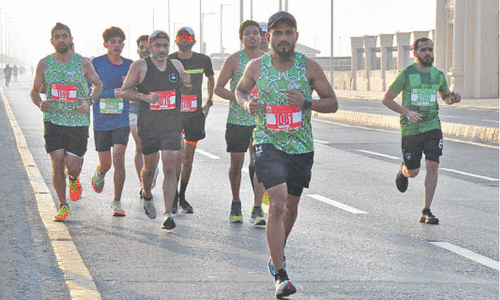DAKAR, Aug 19: Remember Eric ‘The Eel’ Moussambani, splashing through one of the slowest ever 100 metres freestyle heats before a roaring Sydney Olympics crowd after training in an Equatorial Guinea hotel pool?
Or Eddie ‘The Eagle’ Edwards, the short-sighted ski jumper from Britain? The Jamaican bobsleigh team of 1988?
For many, the heroic underdogs who finish last embody the Olympic spirit but Lamine Gueye, who was the first Winter Olympian from black Africa, fears modern qualification standards are squeezing them off sport’s biggest stage.
“The Olympic philosophy is that the whole world takes part. You have the best in the world but you also have representatives from the lesser countries,” Gueye, who made his Olympic debut as an Alpine skier in Sarajevo in 1984, said in an interview.
For him, that changed when the International Olympic Committee (IOC) introduced more stringent qualification standards for the 1994 Lillehammer Winter Olympics.
Gueye, competing in his third Winter Games, found himself restricted to a single event while a younger Senegalese team mate was barred because he was too far down the world rankings.
In a highly critical book published this year, called Skieur Senegalais Cherche Esprit Olympique (Senegalese Skier Seeks Olympic Spirit), Gueye tells how he started protesting against the new standards.
First he wrote an open letter to the IOC and the International Ski Federation (FIS), whose rankings formed the basis of the qualification system, appealing to them in the name of Pierre de Coubertin, founder of the modern Olympic movement.
An Olympic official said the global federations for individual sports set qualification criteria but Gueye said having them at all was pandering to the limits imposed by television coverage, which accounts for a huge portion of Olympic revenues.
When he tried to take his protest on to the slopes, with “Olympic Spirit?” emblazoned on his ski helmet, officials threatened to ban him because the logo could have been construed as an advertisement.
He removed the message to avoid being disqualified.
The next day in his last Olympic downhill race, he missed a gate and ended unclassified.
Gueye’s Senegalese family are no strangers to struggle.
The skier is named after his grandfather, a Socialist politician elected to the French parliament during the colonial era who gave his name to a law granting French citizenship and rights to all inhabitants of France’s overseas possessions.
“My grandfather instilled his values in me — values of defending just causes and fighting for the things that I believe are important,” Gueye said.
“The struggle has moved on to sport, where it is about fighting corruption, fighting for progress.”
After their father died young, Gueye and his sister spent much of their time with their grandparents until they too died and the children moved to France with their mother, a French fashion model.
Gueye got hooked on skiing after seeing snow for the first time at a boarding school in Switzerland but he was passionate about other sports too.
He made the French national junior ice hockey squad only to miss the European Championships when he crashed his scooter in a Paris street three days before it started. He skipped a high school final exam because he was too engrossed watching the semi-final of the French Tennis Open at Roland Garros.
Living a wild youth in 1970s Paris with the odd modelling job, Gueye won a small role in the James Bond film Moonraker, he relates in his book.
Halfway through filming he had a second, more serious moped crash, scarred his face and was edited to a walk-on part, though his name did not appear in the film’s credits.
Setting his heart on skiing for Senegal in the Olympics, he threw himself into the international ski scene with equal vigour, hitch-hiking across the Alps to competitions and begging or borrowing skis and other gear from rival teams.
“I found myself confronted with prejudices — that Africans, blacks, had not skied, until now,” he said.
He registered the Senegalese Ski Federation without telling the international federation he was the only member.
Gueye is still president of the federation and these days has four skiers competing internationally, sometimes against fellow black African competitors from across the continent.
It is still a struggle, though, especially motivating youngsters to compete when they have only a fraction of the equipment and resources enjoyed by counterparts from top nations such as Austria.
It is not all bad news for the underdogs, who can still compete through wild cards — which allowed both Moussambani and Edwards to take part — though they must reach minimum standards.Moussambani’s friend Stany Kempompo Ngangola, from nearby Democratic Republic of Congo, got to this year’s Beijing Games on a wild card.
He finished his 50 metres freestyle in 35.19 seconds last Thursday — easily the slowest finishing time of all 13 heats.—Reuters












































Dear visitor, the comments section is undergoing an overhaul and will return soon.